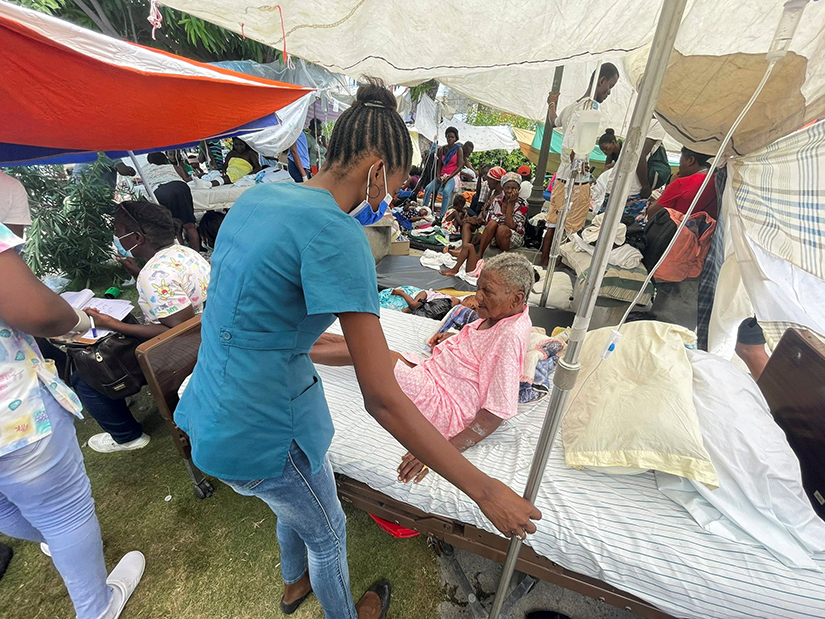 Medical personnel assisted a woman outside a hospital in Les Cayes, Haiti, Aug. 16, following a magnitude 7.2 earthquake two days earlier.Photo Credits: Ricardo Arduengo | ReutersLES CAYES, Haiti — The magnitude 7.2 earthquake that struck Haiti collapsed the bishop’s residence in Les Cayes, killing one priest, leaving one missing and injuring Cardinal Chibly Langlois.
Medical personnel assisted a woman outside a hospital in Les Cayes, Haiti, Aug. 16, following a magnitude 7.2 earthquake two days earlier.Photo Credits: Ricardo Arduengo | ReutersLES CAYES, Haiti — The magnitude 7.2 earthquake that struck Haiti collapsed the bishop’s residence in Les Cayes, killing one priest, leaving one missing and injuring Cardinal Chibly Langlois.
Father Emile Beldor died of his injuries after the Aug. 14 quake. Father Jean-Antoine Coulanges is reported missing. Cardinal Langlois sustained arm and leg injuries; Church sources say his life is not in danger.
Voice of America reported that 18 people, assembled for a baptism, were killed in Immaculate Conception Parish church of Les Anglais.
The Haitian civil protection service reported that nearly 2,000 people had been killed, almost 10,000 were injured and more than 30,250 families needed shelter. Those numbers were expected to rise as a tropical depression headed toward the island. Tropical depression Grace reached Haiti late Aug. 16, bringing torrential rain, and the risk of flooding and landslides.
At the Vatican Aug. 15, Pope Francis expressed his condolences and closeness to the Haitian people.
“While I lift up my prayer to the Lord for the victims, I extend my word of encouragement to the survivors, hoping that the interest of the international community to help might move toward them,” the pope said during his Angelus address. Praying a “Hail Mary” for Haiti, the pope prayed that the “solidarity of all alleviate the consequences of the tragedy.”
Bishop Joseph Gontrand Décoste of Jérémie also called on the international Catholic community for help to rebuild. The diocesan cathedral’s roof was ripped off for the second time in less than five years. Churches across Haiti were severely damaged or destroyed.
“The population is desperate and beleaguered. They are sleeping outside under the trees, in open public spaces, to protect themselves from aftershocks arriving every few hours,” Bishop Décoste told Vatican News.
“We are in distress. We are counting on your solidarity, your proximity.”
Shortly after the news of the quake, Archbishop José H. Gomez of Los Angeles, president of the U.S. Conference of Catholic Bishops, urged people to help by contributing to Catholic Relief Services, the U.S. bishops’ relief and development agency. CRS works in Haiti and partners with Caritas, the international umbrella organization for the Church’s charitable agencies. He also offered prayers for those who had lost loved ones.
“We offer our prayers to Archbishop Launay Saturné, president of the bishops’ conference of Haiti, and to all those who tirelessly serve the faith communities in Haiti. We stand in solidarity with the church in Haiti,” Archbishop Gomez said.
Complicated recovery
Relief workers in Haiti said the Aug. 14 earthquake might not be as catastrophic as the 2010 quake that was closer to the capital, but recovery will be complicated because the quake came on the heels of July’s presidential assassination, of an economic and ongoing political crisis, the coronavirus pandemic and an active storm season now underway.
Fonie Pierre, a public health professional who heads operations in the region for the U.S.-based Catholic Relief Services, lives in Les Cayes, Haiti’s third-largest city and one of the hardest hit by the earthquake magnitude 7.2 earthquake.
While the full extent of the Aug. 14 earthquake is far from fully known, Pierre said history will probably record the 2010 earthquake in Port-au-Prince as far more tragic, with many more people living closely together in densely built urban neighborhoods in the nation’s capital. More than 300,000 people were killed and another 1.3 million left without homes following the magnitude 7 earthquake in 2010.
Pierre said recovery operations were complicated further not only by roads blocked by earthquake damage but by a dangerous, gang-controlled route that connects the south of Haiti to Port-au-Prince.
Fiammetta Cappellini, Haiti-based country representative for the Milan-based AVSI, told CNS by phone Aug. 14 that she traveled from Port-au-Prince to Les Cayes earlier that day. She estimated that some 30% of the buildings were severely impacted by the earthquake.
“All the people are on the street, and night is approaching, and people will be passing the night on the road in the streets; we have a lot of seismic (aftershocks), and so it is dangerous to enter buildings at this time,” Cappellini said.
“Humanitarian activities could be badly impacted by wars among gangs in this area,” she said, adding that she and at least one other relief agency were able to pass through the region Aug. 14. “Absolutely, gang violence will absolutely negatively impact our ability to respond to this catastrophe.”
She worries that a lack of authority and governance in the country following the presidential assassination in July will negatively impact the ability of the government to respond to the earthquake.
“Also there is a lack of everything, including food, in-kind items and so on, and we are expecting local and government authorities not to be so strong in their capacity to answer this emergency. It is difficult to predict the future, but probably we expect a very difficult period over the next months in responding to this new emergency.”